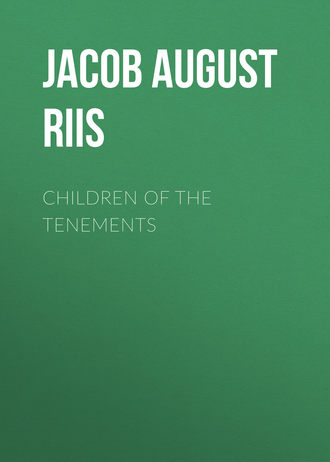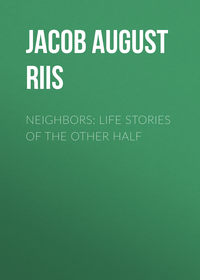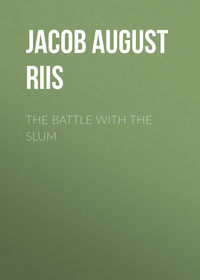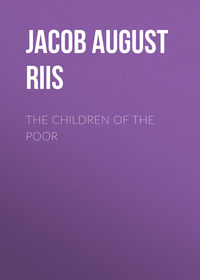 полная версия
полная версияChildren of the Tenements
His investigations were brief, but entirely conclusive. For the second time that day he was spurned, and by a friend. This time it was the deacon himself who drove him from his wife's room, whither he had betaken him with true instinct to ascertain the household intentions. The deacon seemed to be, if anything, in a worse humor than even Jack himself. The doctor had told him that afternoon that Mrs. Pratt was a very sick woman, and that, if she was to pull through at all, she must be kept from all worriment in an atmosphere which fairly bristled with it. The deacon felt that he had a contract on his hands which might prove too heavy for him. He felt, too, with bitterness, that he was an ill-used man, that all his years of faithful labor, in the vineyard went for nothing because of some wretched heresy which the enemy had devised to wreck it; and all his humbled pride and his pent-up wrath gathered itself into the kick with which he sent poor Jack flying back where he had come from. It was clear that the deacon was not going to church.
Lonely and forsaken, Jack took his old seat on the porch and pondered. The wrinkles in his brow multiplied and grew deeper as he looked down the road and saw the Joneses, the Smiths, and the Allens go by toward the church. When the Merritts had passed, too, under the lamp, he knew that it must be nearly time for the sermon. They always came in after the long prayer. Jack took a turn up and down the porch, whined at the door once, and, receiving no answer, set off down the road by himself.
The church was filled. It had never looked handsomer. The rival factions had vied with each other in decorating it. Spruce and hemlock sprouted everywhere, and garlands of ground-ivy festooned walls and chancel. The delicious odor of balsam and of burning wax-candles was in the air. The people were all there in their Sunday clothes and the old minister in the pulpit; but the Sunday feeling was not there. Something was not right. Deacon Pratt's pew alone of them all was empty, and the congregation cast wistful glances at it, some secretly behind their hymn-books, others openly and sorrowfully. What the doctor had said in the afternoon had got out. He himself had told Mrs. Mills that it was doubtful if the deacon's wife got around, and it sat heavily upon the conscience of the people.
The opening hymns were sung; the Merritts, late as usual, had taken their seats. The minister took up the Book to read the Christmas gospel from the second chapter of Luke. He had been there longer than most of those who were in the church to-night could remember, had grown old with the people, had loved them as the shepherd who is answerable to the Master for his flock. Their griefs and their troubles were his. If he could not ward them off, he could suffer with them. His voice trembled a little as he read of the tidings of great joy. Perhaps it was age; but it grew firmer as he proceeded toward the end:—
"And suddenly there was with the angel a multitude of the heavenly host praising God and saying, 'Glory to God in the highest, and on earth peace, good-will toward men.'"
The old minister closed the Book and looked out over the congregation. He looked long and yearningly, and twice he cleared his throat, only to repeat, "on earth peace, good-will toward men." The people settled back in their seats, uneasily; they strangely avoided the eye of their pastor. It rested in its slow survey of the flock upon Deacon Pratt's empty pew. And at that moment a strange thing occurred.
Why it should seem strange was, perhaps, not the least strange part of it. Jack had come in alone before. He knew the trick of the door-latch, and had often opened it unaided. He was in the habit of attending the church with the folks; there was no reason why they should not expect him, unless they knew of one themselves. But somehow the click of the latch went clear through the congregation as the heavenly message of good-will had not. All eyes were turned upon the deacon's pew; and they waited.
Jack came slowly and gravely up the aisle and stopped at his master's pew. He sniffed of the empty seat disapprovingly once or twice—he had never seen it in that state before—then he climbed up and sat, serious and attentive as he was wont, in his old seat, facing the pulpit, nodding once as who should say, "I'm here; proceed!"
It is recorded that not even a titter was heard from the Sunday-school, which was out in force. In the silence that reigned in the church was heard only a smothered sob. The old minister looked with misty eyes at his friend. He took off his spectacles, wiped them and put them on again, and tried to speak; but the tears ran down his cheeks and choked his voice. The congregation wept with him.
"Brethren," he said, when he could speak, "glory to God in the highest, and on earth peace, good-will toward men! Jack has preached a better sermon than I can to-night. Let us pray together."
It is further recorded that the first and only quarrel in the Brownville church ended on Christmas Eve and was never heard of again, and that it was all the work of Jack's sermon.
SKIPPY OF SCRABBLE ALLEY
Skippy was at home in Scrabble Alley. So far as he had ever known home of any kind it was there in the dark and mouldy basement of the rear house, farthest back in the gap that was all the builder of those big tenements had been able to afford of light and of air for the poor people whose hard-earned wages, brought home every Saturday, left them as poor as if they had never earned a dollar, to pile themselves up in his strong box. The good man had long since been gathered to his fathers: gone to his better home. It was in the newspapers, and in the alley it was said that it was the biggest funeral—more than a hundred carriages, and four black horses to pull the hearse. So it must be true, of course.
Skippy wondered vaguely, sometimes, when he thought of it, what kind of a home it might be where people went in a hundred carriages. He had never sat in one. The nearest he had come to it was when Jimmy Murphy's cab had nearly run him down once, and his "fare," a big man with whiskers, had put his head out and angrily called him a brat, and told him to get out of the way, or he would have him arrested. And Jimmy had shaken his whip at him and told him to skip home. Everybody told him to skip. From the policeman on the block to the hard-fisted man he knew as his father, and who always had a job for him with the "growler" when he came home, they were having Skippy on the run. Probably that was how he got his name. No one cared enough about it, or about the boy, to find out.
Was there anybody anywhere who cared about boys, anyhow? Were there any boys in that other home where the carriages and the big hearse had gone? And if there were, did they have to live in an alley, and did they ever have any fun? These were thoughts that puzzled Skippy's young brain once in a while. Not very long or very hard, for Skippy had not been trained to think; what training the boys picked up in the alley didn't run much to deep thinking.
Perhaps it was just as well. There were one or two men there who were said to know a heap, and who had thought and studied it all out about the landlord and the alley. But it was very tiresome that it should happen to be just those two, for Skippy never liked them. They were always cross and ugly, never laughed and carried on as other men did once in a while, and made his little feet very tired running with the growler early and late. He well remembered, too, that it was one of them who had said, when they brought him home, sore and limping, from under the wheels of Jimmy Murphy's cab, that he'd been better off if it had killed him. He had always borne a grudge against him for that, for there was no occasion for it that he could see. Hadn't he been to the gin-mill for him that very day twice?
Skippy's horizon was bounded by the towering brick walls of Scrabble Alley. No sun ever rose or set between them. On the hot summer days, when the saloon-keeper on the farther side of the street pulled up his awning, the sun came over the housetops and looked down for an hour or two into the alley. It shone upon broken flags, a mud-puddle by the hydrant where the children went splashing with dirty, bare feet, and upon unnumbered ash barrels. A stray cabbage leaf in one of those was the only green thing it found, for no ray ever strayed through the window in Skippy's basement to trace the green mould on the wall.
Once, while he had been lying sick with a fever, Skippy had struck up a real friendly acquaintance with that mouldy wall. He had pictured to himself woods and hills and a regular wilderness, such as he had heard of, in its green growth; but even that pleasure they had robbed him of. The charity doctor had said that the mould was bad, and a man scraped it off and put whitewash on the wall. As if everything that made fun for a boy was bad.
Down the street a little way, was a yard just big enough and nice to play ball in, but the agent had put up a sign that he would have no boys and no ball-playing in his yard, and that ended it; for the "cop" would have none of it in the street either. Once he had caught them at it and "given them the collar." They had been up before the judge; and though he let them off, they had been branded, Skippy and the rest, as a bad lot.
That was the starting-point in Skippy's career. With the brand upon him he accepted the future it marked out for him, reasoning as little, or as vaguely, about the justice of it as he had about the home conditions of the alley. The world, what he had seen of it, had taught him one lesson: to take things as he found them, because that was the way they were; and that being the easiest, and, on the whole, best suited to Skippy's general make-up, he fell naturally into the rôle assigned him. After that he worked the growler on his own hook most of the time. The "gang" he had joined found means of keeping it going that more than justified the brand the policeman had put upon it. It was seldom by honest work. What was the use? The world owed them a living, and it was their business to collect it as easily as they could. It was everybody's business to do that, as far as they could see, from the man who owned the alley, down.
They made the alley pan out in their own way. It had advantages the builder hadn't thought of, though he provided them. Full of secret ins and outs, runways and passages not easily found, to the surrounding tenements, it offered chances to get away when one or more of the gang were "wanted" for robbing this store on the avenue, tapping that till, or raiding the grocer's stock, that were A No. 1. When some tipsy man had been waylaid and "stood up," it was an unequalled spot for dividing the plunder. It happened once or twice, as time went by, that a man was knocked on the head and robbed within the bailiwick of the now notorious Scrabble Alley gang, or that a drowned man floated ashore in the dock with his pockets turned inside out. On such occasions the police made an extra raid, and more or less of the gang were scooped in; but nothing ever came of it. Dead men tell no tales, and they were not more silent than the Scrabbles, if, indeed, these had anything to tell.
It came gradually to be an old story. Skippy and his associates were long since in the Rogues' Gallery, numbered and indexed as truly a bad lot now. They were no longer boys, but toughs. Most of them had "done time" up the river and come back more hardened than they went, full of new tricks always, which they were eager to show the boys, to prove that they had not been idle while they were away. On the police returns they figured as "speculators," a term that sounded better than thief, and meant, as they understood it, much the same; viz. a man who made a living out of other people's labor. It was conceded in the slums, everywhere, that the Scrabble Alley gang was a little the boldest that had for a long time defied the police. It had the call on the other gangs in all the blocks around, for it had the biggest fighters as well as the cleverest thieves of them all.
Then one holiday morning, when in a hundred churches the pæan went up, "On earth peace, good-will toward men," all New York rang with the story of a midnight murder committed by Skippy's gang. The saloon-keeper whose place they were sacking to get the "stuff" for keeping Christmas in their way had come upon them, and Skippy had shot him down while the others ran. A universal shout for vengeance went up from outraged Society.
It sounded the death-knell of the gang. It was scattered to the four winds, all except Skippy, who was tried for murder and hanged. The papers spoke of his phenomenal calmness under the gallows; said it was defiance. The priest who had been with him in his last hours said he was content to go to a better home. They were all wrong. Had the pictures that chased each other across Skippy's mind as the black cap was pulled over his face been visible to their eyes, they would have seen Scrabble Alley with its dripping hydrant, and the puddle in which the children splashed with dirty, bare feet; the dark basement room with its mouldy wall; the notice in the yard, "No ball-playing allowed here"; the policeman who stamped him as one of a bad lot, and the sullen man who thought it had been better for him, the time he was run over, if he had died. Skippy asked himself moodily if he was right after all, and if boys were ever to have any show. He died with the question unanswered.
They said that no such funeral ever went out of Scrabble Alley before. There was a real raid on the undertaker's where Skippy lay in state two whole days, and the wake was talked of for many a day as something wonderful. At the funeral services it was said that without a doubt Skippy had gone to a better home. His account was squared.
*****Skippy's story is not invented to be told here. In its main facts it is a plain account of a well-remembered drama of the slums, on which the curtain was rung down in the Tombs yard. There are Skippies without number growing up in those slums to-day, vaguely wondering why they were born into a world that does not want them; Scrabble Alleys to be found for the asking, all over this big city where the tenements abound, alleys in which generations of boys have lived and died—principally died, and thus done for themselves the best they could, according to the crusty philosopher of Skippy's set—with nothing more inspiring than a dead blank wall within reach of their windows all the days of their cheerless lives. Theirs is the account to be squared—by justice, not vengeance. Skippy is but an item on the wrong side of the ledger. The real reckoning of outraged society is not with him, but with Scrabble Alley.
MAKING A WAY OUT OF THE SLUM
One stormy night in the winter of 1882, going across from my office to the Police Headquarters of New York City, I nearly stumbled over an odd couple that crouched on the steps. As the man shifted his seat to make way for me, the light from the green lamp fell on his face, and I knew it as one that had haunted the police office for days with a mute appeal for help. Sometimes a woman was with him. They were Russian Jews, poor immigrants. No one understood or heeded them. Elbowed out of the crowd, they had taken refuge on the steps, where they sat silently watchful of the life that moved about them, but beyond a swift, keen scrutiny of all who came and went, having no share in it.
That night I heard their story. Between what little German they knew and such scraps of their harsh jargon as I had picked up, I found out that they were seeking their lost child—little Yette, who had strayed away from the Essex Street tenement and disappeared as utterly as if the earth had swallowed her up. Indeed, I often thought of that in the weeks and months of weary search that followed. For there was absolutely no trace to be found of the child, though the tardy police machinery was set in motion and worked to the uttermost. It was not until two years later, when we had long given up the quest, that little Yette was found by the merest accident in the turning over of the affairs of an orphan asylum. Some one had picked her up in the street and brought her in. She could not tell her name, and, with one given to her there, and garbed in the uniform of the place, she was so effectually lost in the crowd that the police alarm failed to identify her. In fact, her people had no little trouble in "proving property," and but for the mother love that had refused to part with a little gingham slip her lost baby had worn, it might have proved impossible. It was the mate of the one which Yette had on when she was brought into the asylum, and which they had kept there. So the child was restored, and her humble home made happy.
That was my first meeting with the Russian Jew. In after years my path crossed his often. I saw him herded with his fellows like cattle in the poorest tenements, slaving sullenly in the sweat-shop, or rising in anger against his tyrant in strikes that meant starvation as the price of his vengeance. And always I had a sense of groping in the memories of the past for a lost key to something. The other day I met him once more. It was at sunset, upon a country road in southern New Jersey. I was returning with Superintendent Sabsovich from an inspection of the Jewish colonies in that region. The cattle were lowing in the fields. The evening breathed peace. Down the sandy road came a creaking farm wagon loaded with cedar posts for a vineyard hard by. Beside it walked a sunburned, bearded man with an axe on his shoulder, in earnest conversation with his boy, a strapping young fellow in overalls. The man walked as one who is tired after a hard day's work, but his back was straight and he held his head high. He greeted us with a frank nod, as one who meets an equal.
The superintendent looked after him with a smile. To me there came suddenly the vision of the couple under the lamp, friendless and shrinking, waiting for a hearing, always waiting; and, as in a flash, I understood. I had found the key. The farmer there had it. It was the Jew who had found himself.
It is eighteen years since the first of the south Jersey colonies was started.4 There had been a sudden, unprecedented immigration of refugees from Russia, where Jew-baiting was then the orthodox pastime. They lay in heaps in Castle Garden, helpless and penniless, and their people in New York feared prescriptive measures. What to do with them became a burning question. To turn those starving multitudes loose on the labor market of the metropolis would make trouble of the gravest kind. The alternative of putting them back on the land, and so of making producers of them, suggested itself to the Emigrant Aid Society. Land was offered cheap in south Jersey, and the experiment was made with some hundreds of families.
It was well meant; but the projectors experienced the not unfamiliar fact that cheap land is sometimes very dear land. They learned, too, that you cannot make farmers in a day out of men who have been denied access to the soil for generations. That was the set purpose of Russia, and the legacy of feudalism in western Europe, which of necessity made the Jew a trader, a town dweller. With such a history, a man is not logically a pioneer. The soil of south Jersey is sandy, has to be coaxed into bearing paying crops. The colonists had not the patient skill needed for the task. Neither had they the means. Above all, they lacked the market where to dispose of their crops when once raised. Discouragements beset them. Debts threatened to engulf them. The trustees of the Baron de Hirsch Fund, entering the field eleven years later, in 1891, found of three hundred families only two-thirds remaining on their farms. In 1897, when they went to their relief, there were seventy-six families left. The rest had gone back to the city and to the Ghetto. So far, the experiment had failed.
The Hirsch Fund people had been watching it attentively. They were not discouraged. In the midst of the outcry that the Jew could not be made a farmer, they settled a tract of unbroken land in the northwest part of Cape May County, within easy reach of the older colonies. They called their settlement Woodbine. Taught by the experience of the older colonists, they brought their market with them. They persuaded several manufacturing firms to remove their plants from the city to Woodbine, agreeing to furnish their employees with homes. Thus an industrial community was created to absorb the farmer's surplus products. The means they had in abundance in the large revenues of Baron de Hirsch's princely charity, which for all purposes amounts to over $6,000,000. There was still lacking necessary skill at husbandry, and this they set about supplying without long delay. In the second year of the colony, a barn built for horses was turned into a lecture-hall for the young men, and became the nucleus of the Hirsch Agricultural School, which to-day has nearly a hundred pupils. Woodbine, for which the site was cleared half a dozen years before in woods so dense that the children had to be corralled and kept under guard lest they should be lost, was a thriving community by the time the crisis came in the affairs of the older colonies.
The settlers were threatened with eviction. The Jewish Colonization Association, upon the recommendation of the Hirsch Fund trustees, and with their coöperation, came to their rescue. It paid off the mortgages under which they groaned, brought out factories, and turned the tide that was setting back toward the cities. The carpenter's hammer was heard again, after years of silence and decay, in Rosenhayn, Alliance, and Carmel. They built new houses there. Nearly $500,000 invested in the villages was paying a healthy interest, where before general ruin was impending. As for Woodbine, Jewish industry had raised the town taxes upon its 5300 acres of land from $72 to $1800, and only the slow country ways kept it from becoming the county-seat, as it is already the county's centre of industrial and mental activity.
It was to see for myself what the movement of which this is the brief historical outline was like that I had gone down from Philadelphia to Woodbine, some twenty-five miles from Atlantic City. I saw a straggling village, hedged in by stunted woods, with many freshly painted frame-houses lining broad streets, some of them with gardens around in which jonquil and spiderwort were growing, and the peach and gooseberry budding into leaf; some of them standing in dreary, unfenced wastes, in which the clay was trodden hard between the stumps of last year's felling. In these lived the latest graduates from the slum. I had just come from the clothing factory hard by the depot, in which a hundred of them or more were at work, and had compared the bright, clean rooms with the traditional sweat-shop of the city, wholly to the disadvantage of the latter. I had noticed the absence of the sullen looks that used to oppress me. Now as I walked along, stopping to chat with the women in the houses, it interested me to class the settlers as those of the first, the second, and the third year's stay and beyond. The signs were unmistakable. The first year was, apparently, taken up in contemplation of the house. The lot had no possibilities. In the second, it was dug up. A few potato-vines were planted, perhaps a peach tree. There were the preliminary signs of a fence. In the third, under the stimulus of a price offered by the management, a garden was evolved, with, necessarily, a fence. At this point the potato became suddenly an element. It had fed the family the winter before without other outlay than a little scratching of the ground. Its possibilities loomed large. The garden became a farm on a small scale. Its owner applied for more land and got it. That was the very purpose of the colony.
A woman, with a strong face and shrewd, brown eyes, rose from an onion bed she had been weeding to open the gate.
"Come in," she said, "and be welcome." Upon a wall of the best room hung a picture of Michael Bakounine, the nihilist. I found it in these colonies everywhere side by side with Washington's, Lincoln's, and Baron de Hirsch's. Mrs. Breslow and her husband left home for cause. He was a carpenter. Nine months they starved in a Forsyth Street tenement, paying $15 a month for three rooms. This cottage is their own. They have paid for it ($800) since they came out with the first settlers. The lot was given to them, but they bought the adjoining one to raise truck in.











